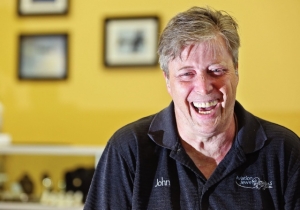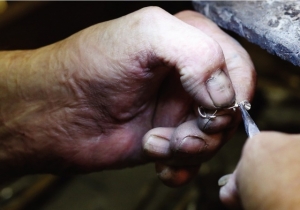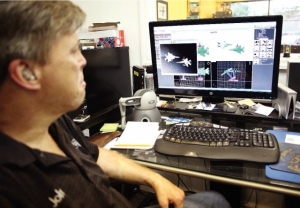Helping hands
By Kirsten Ballard
Published in News on August 12, 2015 1:46 PM

News-Argus/CASEY MOZINGO
John Witt laughs in the front of his shop, Aviation Jewelry Designs, Tuesday afternoon. John's humor and persistence are two of the reasons he has remained successful despite battles with his health and insurance companies -- and the main reason the community is rallying behind him with a GoFundMe page.

News-Argus/CASEY MOZINGO
John Witt puts the finishing touches on a pendant he designed. He prides himself on his attention to detail.

News-Argus/CASEY MOZINGO
John Witt waits for a rendering of an F-15E using a program called Matrix.
John Witt stands shirtless in an insurance office in Atlanta.
He has on shorts, but no socks.
He makes a slow circle with his arms held wide.
"My name is John Witt," he says to the claims agent. "I want you to know that I am not a number or a piece of paper. I want you to see what's been done to me."
*
The world is slowly becoming quieter for Witt, as his hearing aids fail -- again.
He is behind on rent.
He avoids relationships because he doesn't want to drag anyone down with him.
He sleeps on a futon in the back of his store, Aviation Jewelry.
His shop is his world, it is his passion and his pride -- a small consolation in a life full of hardships associated with a welding accident.
And yet, he fights.
"I'm very close to losing all of this," he said.
*
Witt grew up in the jewelry business -- working with jewels and metals when he was only 9.
At 20, he began working on trucks in his hometown of Ocala, Fla.
"In a sense, I was just doing bigger jewelry," he quipped.
On Jan. 19, 1982, his boss wanted him to repair a tank for a truck.
It had been mounted before, and Witt was concerned that fuel lines had been run through the tank.
"I just had a feeling," he said.
He talked with his lead man. He was told the tank had been purged, and if anything, it carried diesel, which is not as combustible.
"He said, 'Go ahead and get it done.' It would be fine," Witt said.
He knelt on the tank and lit his torch.
Seconds later, Witt was thrown more than 10 feet into the air.
He crashed onto the concrete floor -- a human torch.
He couldn't remove his welding hood because of the skin melting off his hand.
He remembers frantically looking for the quenching tub to douse himself.
But someone had moved it.
He tried to stop, drop and roll, but the ground was littered with bumpers, engine covers and antifreeze spills.
Flames continued to engulf him as he ran from the room.
The first person to get to him grabbed a carbon dioxide fire extinguisher to put out the flames consuming Witt's body.
It was empty.
It took seven fire tubes before finding a chemical powder extinguisher that worked.
On the way from the hospital, the ambulance had transmission trouble. They couldn't afford to wait, so the fire truck raced him to Munroe Regional Medical Center in Ocala.
Witt began to pray.
"I knew it was bad, I didn't think I would make it," he said.
He transferred to Shanes Teaching Hospital in Gainesville, Fla., but they couldn't transport him by air.
"I was really upset, I thought that would be my only chance to fly," he said.
He had always wanted to be a pilot.
As doctors evaluated him, they couldn't find a pulse in his left hand. They were going to have to amputate.
"I can remember looking at my hand, concentrating so hard to move it," he said.
He twitched a few fingers and kept all of his limbs.
But, 70 percent of his body was covered in third-degree burns.
He spent three months in the hospital in Gainesville.
Back in Ocala, the doctors were not equipped to handle such severe burns. And Witt's hands started contracting, making them virtually useless.
"The only way you could tell these were fingers were because of the nails," he said.
He went to doctors in Miami and was told he might get 15 percent use of his hands. He would have to learn to do things a different way.
"That was unacceptable," he said.
The University of Texas Medical Branch in Galveston had the top of burn unit in the United States. Witt contacted the staff.
Dr. Sally Abston evaluated him. She held her hands out and opened and closed her fists.
"She said, 'When I get done with you, you're going to be able to do this,'" he said.
Through skin grafts, surgeries and physical therapy, Witt regained 60 percent of his hand functionality.
There have been adverse side effects to all the medication and treatments.
The medicine -- and subsequent staph infections -- rendered him nearly deaf.
His legs are patchworked with skin grafts.
A blood transfusion in the 1990s gave him hepatitis C.
But he will not give up.
He was declared 100 percent disabled by medical professionals.
He would not return to work.
So when, after moving to Goldsboro in 2001, he opened a simple shop along Cashwell Drive, it was a triumphant moment for a man wrought with misfortune.
But it is not enough that he went from 100 percent disabled to creating award-winning jewelry.
His success story is not done.
Witt wants to help people. He wants to take victims and to give them back their pride and their power.
Inside that humble jewelry shop, he has set up benches where one day wounded warriors can be trained and empowered. They can rebuild a life, like he has.
"This is a way I can help people," he said. "This is really cool. I can work with wounded warriors, they're going to fit in with this (military jewelry). It keeps them with their pride, the things they've done."
Witt dreams of visiting Veterans Affairs hospitals, burn units and other disabled people, to give them hope.
But for the first time, he feels like giving up.
"Sometimes I put down my head and cry," he said.
*
Witt has meticulous attention to detail.
He had his family set up his workbench.
It took him several days, but he made a ring -- with only one hand.
In the late 1980s, a doctor prescribed his jewelry work as therapy. He has to keep his hands moving constantly so the scar tissue doesn't reattach.
He has to pace himself. There are some days he can't work at all. This makes him a handicap to a business.
"The only way I can do this is to own my own business," he said.
In 1996, Witt and a partner started Jewelry Masters of Virginia. His partner was able to handle the tasks he was not physically able to do.
"There's a lot I can't do," he said.
Witt was able to create intricate designer pieces. It was all coming together.
Until his partner was charged with embezzling and not paying withholding taxes.
The business closed.
Witt was cleared of any charges.
He moved to Goldsboro with his second wife, Mary, in 2001.
"I hated it here," he said.
The world-class jeweler was resigned to doing repair work in the back of a shop.
He was missing a niche and a purpose.
"I knew God brought me here for a reason," he said.
A pilot by the name of Matt Hall came into Hearnes Jewelers on Ash Street where Witt was working as a contractor at the time.
Hall commissioned a stunt airplane.
"I've never found anything I couldn't do, so I said sure," Witt said.
He made an F-15E to accompany it as a way to make some extra money.
"It started clicking," he said.
His lifelong obsession with planes was coming to fruition.
Witt has always felt called to help people with disabilities. He and his father taught a wheelchair-bound man how to silversmith when Witt was younger.
Now he is going to work with retired wounded veteran Kevin Tenney on translating his designs into wood pieces that can function as plaques and coasters.
"Doing that, and going through what I've done, I want to share my skills," he said.
In 2009, he opened Aviation Jewelry.
He is known for his detailed military aircraft pieces and emblems.
His slogan, "Detail makes the difference," is a testament to his intricate work, which has been sold in 20 countries.
But his struggles are far from over.
*
Witt has been battling his insurance company for years.
The company, he says, wants him to settle his case -- and in the past, has refused some treatments.
So Witt is taking them to court to secure a lifeplan.
"As I get older, I'm going to have problems and difficulty," he said.
In many respects, he already does.
His hepatitis C is gone -- the result of finally being approved to participate in a drug trial -- but the medicine left him fatigued.
His hands cramp when he writes.
And because of the damage, typing on a keyboard is nearly impossible.
His inability to type often leaves a communication gap between him and his investors. He does not have the funds to hire help, and without help, he doesn't have the funds to stay in business.
As some scar tissue reattaches, his nerves in his arms are compressing. He is in constant pain as the nerves misfire.
He will need continual medical help for the rest of his life.
So settling his claim, he said, would save the insurance company millions.
"They set me up for failure," he said.
Through lawyers, endless litigation and a barrage of doctor's appointments, Witt says the insurance company is slowly leveraging his need for medical care against his business.
But he has had some recent victories, including new hearing aids.
"I can communicate again," he said.
However, he is still prepared for a long, hard fight.
"We're a long ways from all this being over," he said.
*
And now, some of his friends want to help.
Local restaurateur Ed Cogdell of Ed's Southern Food and Spirits has set up a GoFundMe page for Witt. Thus far, community members and former clients have donated to help their friend catch up on his bills.
In the first 14 days, $729 had been donated.
"He has a wonderful personality," Cogdell said. "I became fascinated with what he does."
And because Witt's story moved him -- and he believes in the man's mission to help wounded warriors find work -- Cogdell titled the page "Let's Help a Helper."
"I love John. He's my best friend," Cogdell said. "I think the world of him. I want to help him however I can."
And he wants the community to lend a hand, too.
After all, Witt now knows that to the small community he once hated, he is far more than a number or a piece of paper.
His work touches lives. And for that reason, men like Cogdell want to ensure it continues -- as long as Witt's body will allow it to.
